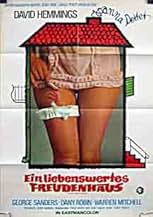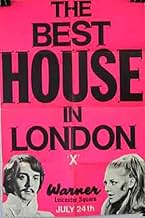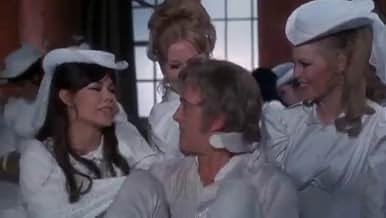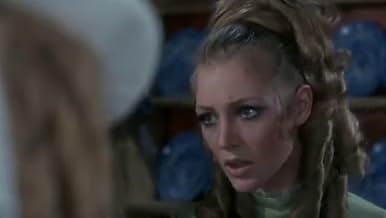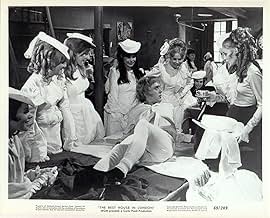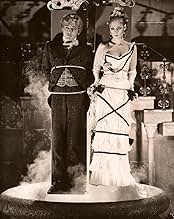In Victorian London, the British Government attempts a solution to the problem of prostitution by establishing the world's most fabulous brothel.In Victorian London, the British Government attempts a solution to the problem of prostitution by establishing the world's most fabulous brothel.In Victorian London, the British Government attempts a solution to the problem of prostitution by establishing the world's most fabulous brothel.
- Director
- Writer
- All cast & crew
- Production, box office & more at IMDbPro
Featured reviews
A two-joke film, and neither of them are funny
The film is a comedy about a proposal to set up a government-sponsored brothel in Victorian London and the resistance to that proposal led by Lady Josephine Pacefoot, an anti-prostitution campaigner. Hemmings plays two characters, Walter Leybourne, the instigator of the scheme, and Benjamin Oakes, an idealistic young journalist who gets involved in Lady Josephine's campaign. The physical similarity between the two men is explained when they turn out to be long-lost half-brothers; both (implausibly, given Hemmings's blond looks) are illegitimate sons of the Chinese Ambassador.
The film is some time during the reign of Queen Victoria, although it is impossible to be more precise than that. The fact that Elizabeth Barrett and Robert Browning are courting but not yet married would suggest that the action takes place around 1845. (They married in 1846). The presence of Oscar Wilde and Lord Alfred Douglas, who first met in 1891, coupled with references to Jack the Ripper (1888) and the Eiffel Tower (1889), would however suggest a date nearly fifty years later. The writer Denis Norden stuffed the script with references to events such as the Opium Wars and the Indian Mutiny and there are walk-on appearances by various other Victorian celebrities, such as Dickens and Tennyson. Norden seems to have deliberately ignored the fact that, as Victoria ruled for over sixty years, many people whom we think of as "Victorians" were far from exact contemporaries of one another.
I was surprised to see reviews on this board comparing the film to Monty Python, as it seems to me to have little to do with the Pythonesque or Goonish tradition of surreal humour, despite the presence of a pre-Python John Cleese in a minor role. Rather, it derives from a quite different strand of British humour, the bawdy tradition of the "Carry On" films. This tradition was already strong in the late sixties, and was to become the dominant one in the British cinema (although fortunately not on television) during the seventies. The film has also been described as satirical, although it contains little satire worthy of the name; it is hardly cutting-edge humour to satirise the ways of a hundred years ago. As for the suggestion that Josephine Pacefoot is a satirical portrait of Dame Josephine Butler, I cannot for the life of me see why Norden might have wanted to satirise someone who had been dead for more than sixty years when the film was made and who the great majority of his audience would never have heard of.
What the film does contain is a good deal of semi-nudity and innuendo-laden humour. Most sixties sex comedies today seem about as offensive as a seaside postcard, and a lot of the material in "The Best House in London" today seems bland and harmless, if not particularly funny. Nevertheless, some scenes actually seem worse today than they probably did forty years ago. At one point we hear a suggestive song about "my pussy". Had this song been performed by an adult woman, it would today provoke nothing more than a sigh of "Oh no! Not that old joke again!" (Even in the sixties jokes playing on the fact that the same word can mean both "cat" and "vagina" must have seemed pretty corny). As, however, it is sung by a young child, it comes across today as an unpleasant, even sinister, piece of humour.
Although the film does not tell us much about the age in which it is ostensibly set, it does perhaps inadvertently tell us something about the age in which it was made. It is essentially a two-joke film. The first joke is that, behind a mask of piety and respectability, Victorian men were in fact all incredibly randy. The second joke is that Victorian women were mostly at heart prostitutes; the saintly Lady Josephine's endeavours to save women from a life of degradation are constantly thwarted by the fact that they do not want to be saved and would much prefer to continue to prostitute themselves.
The first of these jokes is perhaps based upon a half-truth; social disapproval of vice and prostitution has never, in the Victorian age or any other, prevented it from flourishing. Behind the laughter, however, one can detect the uneasiness which the advocates of sixties permissiveness felt about Victorian values; the film never tackles nineteenth-century objections to prostitution head on but evades them by suggesting that they were never anything more than a hypocritical façade. As for the second joke, that is surely rooted in some very strange and distorted attitudes towards women. The wonder is that forty years ago such attitudes were put forward as being somehow progressive. Neither joke ever succeeds in raising many laughs. 4/10
unfunny sex comedy
It's a sex comedy and it's an odd one. The central theme is that these women are being taken advantaged by these men. In the recreations, the women are gleefully being 'taken advantaged'. It's not a funny joke. The choppy nature of the film doesn't help. It's one vignette after another and few are even mildly funny. I don't care about Josephie and Benjamin. The plot does sometimes take interesting turns, but I still don't care. It's an unfunny sex comedy.
Uses the same set as 'Oliver'
Political incorrectness gone mad
Thoroughly enjoyable
Some may consider films such as these "bad", and theoretically I guess they'd be right. But if you're even a passing fan of the British comedy tradition, this movie brings together an intelligent and funny script by the brilliant Denis Norden, and a large cast of inspired and famous British comics. Its outrageous premise offers scope for first-class humour, great inter-textual pedantry, and witty social commentary. In the tradition of the Goons, the film is a biting and staggeringly funny indictment of Victorian moralism and piety, which was as apt in the post-war decades as it is in the politically-correct eco-religious world of today.
If you object to seeing middle-class hypocrisies (not to mention none-too-innocent maidens) skewered, don't see it. Otherwise, I can heartily recommend it.
If you're a fan of British humour, you need this in your collection, alongside the Goons, the Pink Panther, Blackadder, Monty Python, Spitting Image and the collected writings of Oscar Wilde, Spike Milligan and PG Wodehouse.
Grand stuff.
Did you know
- TriviaThe last feature film of Martita Hunt.
- Quotes
Sir Francis Leybourne: [the Attache is sobbing] I thought you people were supposed to be inscrutable?
Chinese Trade Attache: Please, Sir Francis, China doesn't want any more opium.
Sir Francis Leybourne: Oh, do be sensible. You chaps have already lost one war with Great Britain about this.
Chinese Trade Attache: But to force us to buy it...
Sir Francis Leybourne: Well, you signed a treaty agreeing to!
Chinese Trade Attache: Your gunboats were right up our Yangtze!
Sir Francis Leybourne: No use getting hysterical, Mr Feng.
Chinese Trade Attache: Then let me appeal to our friendship; those happy weekends I used to spend at your townhouse; your late wife was always so kind to me. More than kind. She...
Sir Francis Leybourne: She was an eccentric about the inferior races. My dear fellow, I've put a lot of money into that opium plantation. Damn it, it's hard enough to get the Indians to harvest the stuff. Blasted natives! You pay them two pounds ten a year and they're useless.
Chinese Trade Attache: If you could see what the opium does to our people; they lie about the streets like dead flies.
Sir Francis Leybourne: Well, get them to use a little self-discipline, man. Self control - works wonders. Look at the English!
- ConnectionsReferenced in The Magic Garden of Stanley Sweetheart (1970)
- How long is The Best House in London?Powered by Alexa
Details
- Runtime
- 1h 37m(97 min)
- Aspect ratio
- 1.85 : 1

